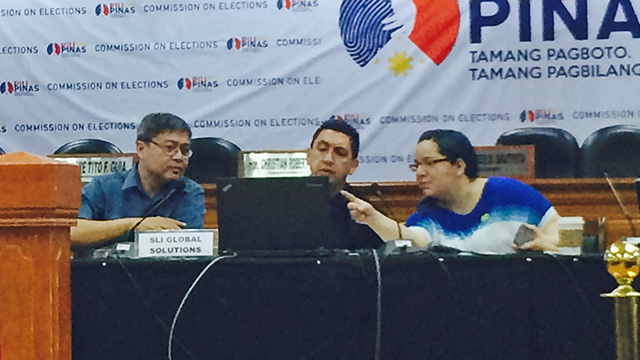
MANILA, Philippines – Speaking before the families of cops slain during a bungled operation last year, President Benigno Aquino III vowed justice for the police command while hitting "leaders who fell short of their duty."
Aquino was the guest of honor on Monday, January 25, during the Philippine National Police (PNP)'s tribute to the "SAF 44" – elite police commandos slain during an ill-fated operation one year ago in Mamasapano, Maguindanao.
The President led the awarding of posthumous Medals of Valor to families of 2 SAF troopers and Medals of Kabayanihan to the 42 others. "Ang panawagan natin sa Kongreso: Suriin ang PNP Law; tukuyin natin ang mga probisyong pumipigil sa agarang pagpapataw ng parusa sa mga pinunong nagkukulang sa kanilang tungkulin," said the President, alluding to retired Police Director Getulio Napeñas, SAF chief when the operation took place. (We ask Congress: Scrutinize the PNP Law; identify the provisions that prevent the organization from punishing commanders who are remiss in their duty.)
The President met privately with the families of slain SAF troopers after the awarding. But not all of the SAF 44 were represented.
The families of 3 troopers opted not to send a representative to claim the awards while a handful asked classmates or SAF comrades to accept the award on their behalf.
In past speeches and pronouncements, Aquino pinned the blame on Napeñas who he said failed to follow his instructions to coordinate with military forces in the area. Napeñas is running for senator under the party of United Nationalist Alliance standard-bearer Vice President Jejomar Binay.
The pinned down SAF troopers – members of the 55th and 84th Special Action Companies (SACs) – were caught in intense clashes against Muslim rebels. The SAF asked for support in the form of artillery, but the military was unable to send any, supposedly because they lacked
sufficient information.
Aquino to blame instead?
But there are those who accuse the military – and Aquino – of withholding much needed artillery support because of the proposed Bangsamoro Basic Law, the result of a peace deal between the administation and the Moro Islamic Liberation Front. (READ: Enrile: I'll prove Aquino did nothing to save SAF)
The Senate, in fact, is re-opening its probe into the incident on Wednesday, January 27. (READ: What did Aquino know?)
But on Monday, the President stressed: "Ayaw po nating maulit ang mga trahedyang dulot lamang ng pagsuway sa mga patakaran. Hindi makatwirang magpatuloy ang sistema kung saan may karaniwang indibidwal na pumapasan ng mas mabibigat na obligasyon dahil sa kapabayaan ng iilan." (We don't want a repeat of the tragedy caused by violations of rules. It's unfair to allow a system where ordinary people are made to suffer for the neglect of the few.)
While he's been consistent in blaming Napeñas for the carnage, Aquino rarely mentions another police general involved in the planning of the operation: former PNP Alan Purisima, a close friend of his who was suspended at the time of the operation.
The President, in a January 9 briefing with police officials in his official residence Bahay Pangarap, instructed them to coordinate with the military prior to the operation.
Napeñas had told probers that Purisima's assurance that he would coordinate with then AFP chief of staff General Gregorio Catapang made him assume that coordination would be Purisima's task.
In the end, the SAF only coordinated with the military and other top police officials "time on target" or only after the target was killed.
Amid accusations of a cover-up, Aquino's ratings plummeted to their lowest in the aftermath of the clash.
Justice delayed
One year since, there have been no arrests made in connection with the death of the 44 SAF troopers, the 17 MILF fighters or the 3 civilians who die dad a result of the operation.
Speaking to grieving families, Aquino said he too was "impatient" with the pace of the country's justice system.
"Alam po natin: Sa kabila ng mga parangal at ayuda, hindi kailanman matutumbasan ang pagkawala ng inyong mga mahal sa buhay. Hindi maghihilom ang sugat sa nangyaring trahedya kung, isang taon na ang nakalipas, ay mailap pa rin ang hustisya sa kanilang pagkamatay," he
said.
Aquino added: "Gaya ninyo, ako man po ay naiinip sa bagal ng pag-usad ng sistemang pangkatarungan sa ating bansa. Ika nga: Justice delayed is justice denied. Makakaasa kayo, kasabay ng pagsigurong nabibigyan ng suporta ang pamilya ng SAF 44, puspusan ang ating pagsisikap para makamit ang hustisya." (Please be assured of support for the families of SAF 44 and our resolve to give them justice.) – Rappler.com

























